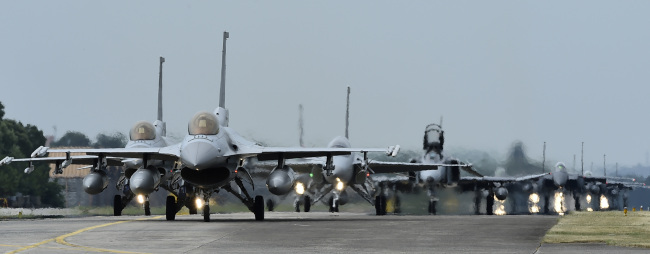The US remains open to dialogue with North Korea, US Secretary of State Rex Tillerson said Tuesday, after Pyongyang delayed its decision on a missile strike plan targeting Guam.
Despite signs of eased military tensions between Washington and Pyongyang, concerns over North Korea’s provocations persist, as an annual joint military drill between South Korea and the US is to take place soon.

South Korean fighter jets are seen on the runway of the Cheongju International Airport during the Soaring Eagle aerial exercise in 2016. Air Force
Tillerson re-expressed willingness to establish dialogue with North Korea, but said “it is up to” the hermit state’s leader Kim Jong-un to offer grounds for the dialogue. The US top official made a similar statement at the ASEAN Regional Forum in Manila earlier this month, underlining the North’s denuclearization as a precondition for the talk.
Hours before Tillerson’s statement, Kim said that he would delay the Guam missile strike plan and “watch a little more the foolish and stupid conduct of the Yankees,” according to Pyongyang’s state-run Korean Central News Agency on Tuesday.
Tillerson added he had no immediate response to Kim’s decision.
Chinese Foreign Minister Wang Yi also urged the US and North Korea to “hit the brakes” on threatening words and actions, and work toward a peaceful resolution of their dispute.
In a phone conversation Tuesday with his Russian counterpart Sergei Lavrov, Yi said that the two countries should permit no one to “stir up an incident on their doorstep.”
China and Russia have both called for the US to suspend large-scale military exercises in exchange for North Korea suspending its missile and nuclear test as a first step toward talks.
An annual South Korea-US military drill will begin Monday.
South Korea is on the alert for signs of a major provocation from the North ahead of the Ulchi Freedom Guardian drill, which Pyongyang has called a rehearsal for an invasion of the North.
Earlier this week, the Associated Press reported the US had been pursuing and continuing back-channel diplomacy with North Korea for several months, even amid US President Donald Trump’s rough exchanges of threats with Pyongyang.
Joseph Yun, the US envoy for North Korea policy and Park Song-il, a senior North Korean diplomat at the United Nations, are involved in what US officials call the “New York channel,” said AP, citing unidentified US officials. Yun is reportedly the only US diplomat directly engaged with the North.
Tillerson also said the US has “other means of communication” with North Korea “to certainly hear from them if they have a desire to want to talk,” at the Manila security forum.
But the possibility of a Pyongyang-Washington back channel has sparked concerns here over South Korea’s diplomatic isolation in such dialogue. South Korean lawmakers have been voicing worries that South Korea may be sidelined by other nations when dealing with the North Korean issues.
Opposition parties have been urging the Moon Jae-in administration to adopt a bold stance in the face of a possible armed conflict.
“US President Donald Trump is making statements hinting at a possible war, and the North is talking about firing missiles to Guam. And what the Blue House (the presidential office) is saying, that the North is being a little sensitive, shows the government’s attitude,” Liberty Korea Party Vice Floor Leader Rep. Min Kyung-wook said at a party meeting last week.
Pyongyang has so far remained silent over Seoul’s proposal to restart inter-Korean talks and alleviate military tension along the border.
The North test-fired a submarine-launched ballistic missile into the East Sea on Aug. 24, 2016, which coincided with last year’s exercise period.
The Moon administration vowed to do “all it can” to prevent war on the Korean Peninsula and called for dialogue, stressing North Korea’s nuclear issue must be dealt with in a “peaceful manner.” The statement came during the president’s first Liberation Day address Tuesday, marking the 72nd anniversary of Korea’s liberation from the 1910-1945 Japanese colonial rule.
Moon also said that no country could declare war in Korea without the consent of the South Korean government.
The South Korean president is planning to hold a nationally-televised press conference here Thursday to answer questions on issues that surround the Korean Peninsula, said Cheong Wa Dae on Wednesday.
The event is expected to delve into questions regarding South Korea’s current stance toward the North Korean nuclear issue as a member of the international community.
By Jung Min-kyung (
mkjung@heraldcorp.com)





![[Weekender] How DDP emerged as an icon of Seoul](http://res.heraldm.com/phpwas/restmb_idxmake.php?idx=645&simg=/content/image/2024/04/25/20240425050915_0.jpg&u=)
